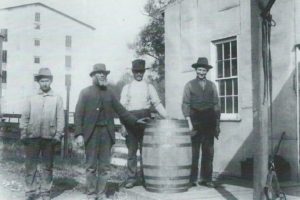The enterprise of whiskey manufacture at the Roxbury Distillery Company along Antietam Creek generated substantial economic benefits to the community. Barrels were supplied by a cooper’s shop at Devil’s Backbone and the barrel hoops were forged at Edward Stockslager’s blacksmith shop at Devil’s Backbone, later at Breathedsville. Stonemasons and builders were hired to construct the numerous sturdy buildings that constituted the settlement. Drivers and horse-drawn wagons were needed to transport the barrels to the rail platform for distribution to large eastern cities. With the boarding house, hotel, general store, post office, school and all of the activity around the distillery, Roxbury must have been a bustling place. George Gambrill had invested heavily in his business, rebuilding after the devastating fire of 1900, and with the onset of WW I, financial problems mounted. But it was the 1917 adoption of the 18th amendment prohibiting the manufacture, sale or transportation of intoxicating liquors that sealed the company’s doom. In 1918, William Hargrave bought 30.48 acres and all of the personal property of the Roxbury Distillery Company for $5. Roxbury managed to hold on for just a few years. The postmaster left in 1920 and the school remained open until 1931. Today, the site where the village once resonated with the sounds of commerce and industry stands silent, but for the intoxicating sound of Antietam’s riffles.
PHOTO shows employees of the Roxbury Distilling Company with a barrel of whiskey about 1910. Courtesy Boonsborough Museum of History.



